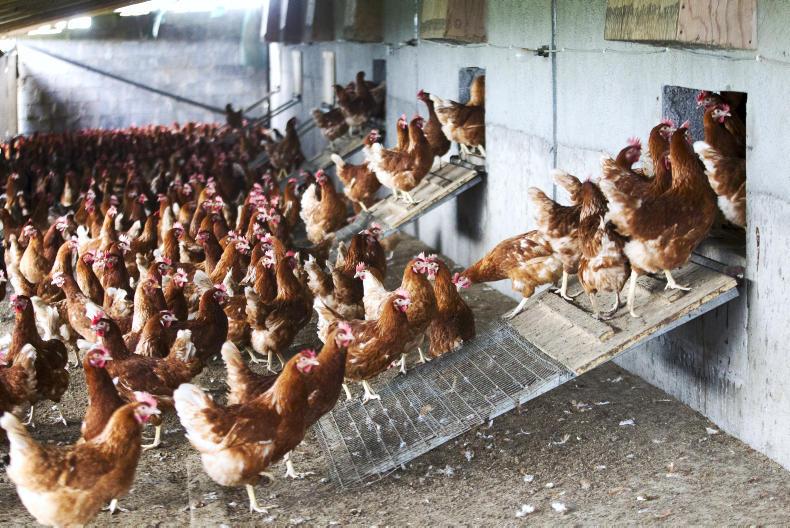A change to EU legislation is expected to be made in the coming weeks, which will extend the derogation that can be applied to eggs from free-range birds, housed by law under a prevention zone due to an outbreak of avian influenza (AI).
At present, if free-range birds are housed, the eggs can continue to be marked as free-range for up to 12 weeks. After that, the eggs must be marked as barn, or (as happened in early 2017) a label applied to packs to indicate the birds have been temporarily housed in barns.
However, speaking at an AI roadshow held at Greenmount last week, Stephen Johnston from DAERA food policy, said that the European Commission has been looking at the requirements, in light of the outbreaks of AI last winter.
“The derogation is likely to change to 16 weeks, with applications made on a flock-by-flock basis. That is our understanding. It is not finalised, but we think it is going to happen. There are still a few issues to be clarified,” Johnston said.
However, it seems that the 16-week derogation is only for egg producers, and will not apply to poultrymeat. If a free-range producer is required to house for more than 12 weeks, the rules stay the same, and the meat will have to be labelled as barn-reared.
Risk
For the industry, the main issue at present is whether the derogations will be required this winter. With the virus endemic in parts of Europe, and with the migratory bird season about to start, the threat could be significant later in the year. There is no reason to think, at present, that the threat will be any less.
“We were lucky last winter. This winter could be different,” noted DAERA chief vet, Robert Huey in his opening remarks at the roadshow.
Despite over 1,000 cases across Europe last winter, Britain and Ireland remained relatively clear, with 13 confirmed outbreaks of the H5N8 strain in Britain (both commercial and backyard flocks), and none in Ireland (although it was confirmed in wild birds).
However, if a case was confirmed here (in a commercial or backyard flock), the implications are significant. AI is a notifiable disease. The default position is to cull infected premises, with a protection zone imposed in a 3km radius, and a surveillance zone in a 10km radius. That will bring movement restrictions and, for the wider industry, an outbreak limits trade.
The message to flockowners continues to be to keep good records and implement best practice in biosecurity. “The financial cost of an outbreak could be huge. You must police your own unit. No vehicles unless they need to be there, no visitors unless essential, no sharing of equipment,” advised Parklands poultry vet Ian Stewart.
He also said that the industry needs to watch out for the weakest link. That could be some older units that aren’t applying best practice or backyard poultry flocks. While the owner of a backyard flock is required to register with DAERA, it is thought that a significant number are ignorant of that requirement, and unaware of the danger they pose, especially if they fail to house birds during a high risk period.
DAERA is considering how it might reach these poultry keepers, perhaps through a feed merchant, or via those selling birds.






 This is a subscriber-only article
This is a subscriber-only article





SHARING OPTIONS: